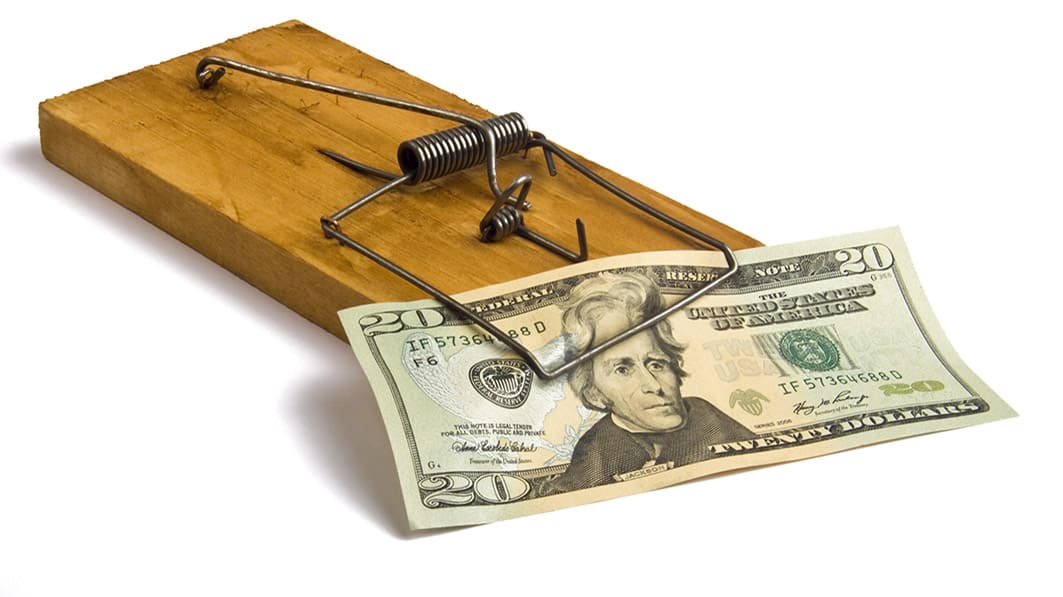My husband loves to catch crawdads, or as they say in some circles, freshwater lobsters. His foolproof method of snagging these crustaceans is to place the cage behind it. As he waves his hand in its face, the creature’s natural defense is to back up—right into the trap.
Like crawdads, it’s all too easy to unknowingly back into a trap—especially when it comes to money. If not careful, the spending decisions we make could back us into a corner—or worse‚Ķdebt. I’ve listed a few of the money traps I’ve managed to escape from; see if you recognize them in your own spending habits.
-
Cell Phones. I don’t know about you, but I’ve been surprised by unexpected charges on my cell phone. What lessons has that cell phone contract taught me?
First, I learned to make sure my cell phone plan met my airtime needs. If you choose a cheaper plan that offers fewer minutes, but then go over your minutes, you might pay more money than if you had purchased the plan offering more airtime.
I also learned to be mindful of the monthly or one-time charges for downloads (games, movies, songs), Internet connections and roaming charges. If you aren’t convinced it won’t add up, google news reports about Apple’s iPhone; some shocked consumers received bills (over 3,000 pages long) that added up to thousands of dollars in roaming and Internet charges. Sure, this is an extreme example, but stop to think about how even an extra $50 bucks a month can send you over budget.
-
Fast Food and Frappuccinos. As a soccer mom who sometimes spends the entire day driving kids around, I’m often tempted to forgo cooking at home and pull into the local drive through. What I notice if I do this too much, however, is that my food bill skyrockets.
The same is true with my mocha craving. One too many of these specialty coffee drinks gives me an empty wallet and expanded waistline.
To combat these temptations, I’ve learned to look for creative time and money-saving alternatives. For example, freezing a double batch of lasagna or enchiladas saves loads of time. Defrost the meat and tada! It’s a fast food meal without the drive-thru cost. I’ll find an equally tempting option when that mocha craving hits. I mix my own delicious coffee drink to keep my monthly budget on track. I buy my coffee on sale, mix it with some powdered chocolate and low fat milk, and enjoy my snack at half the cost‚Ķand half the calories.
-
Shopping. Face it, we can’t avoid this task (or hobby to some) altogether. Still, shopping doesn’t have to turn into a snare for overspending. We’re most often trapped when we buy stuff we don’t really need. We go into the store with one item in mind; the next minute, our cart is full of items we never planned on purchasing.
The solution is to act proactively. Because God commands us to be good stewards of our resources, buying goods wisely should become second nature. How? Before going to a store—grocery store, department store and any place you might be tempted to whip out the wallet—make a list of what you need to buy and fervently stick to it.
We can avoid a second trap—paying full price—by shopping around for the best price. If a dealer offers you a car for half price, most of us perk up and listen. Yet, we often neglect to look for better deals. Grocery stores, for example, make it easy. Every week they send out the food ads, which highlight something called loss leaders. The store actually breaks even or loses profits on these items, but the goal of these ads is to get you into the store so you can buy other items at full price.
-
This and That. Perhaps the biggest trap is the dollar-here-dollar-there spending. Here’s what we often rationalize: A pack of gum doesn’t seem like much; a bottle of water is pretty cheap; those soft serve ice creams for the kids are less than a dollar each.
Add these items together, though, and you’ll find five or more dollars less in your wallet.
There’s nothing wrong with nickel-and-diming yourself; just don’t nickel and dime your budget to death. I make sure I keep my miscellaneous spending in check by keeping a limited amount of cash in my wallet. Then when the money’s gone, so is the spending. (Be sure and keep the receipts from these little expenses to see if you are staying within your allotment!)
The main thing to remember is that overspending is a trap, and it takes a great deal of planning to keep out of.
Luckily for us we’re smarter than crawdads.




















